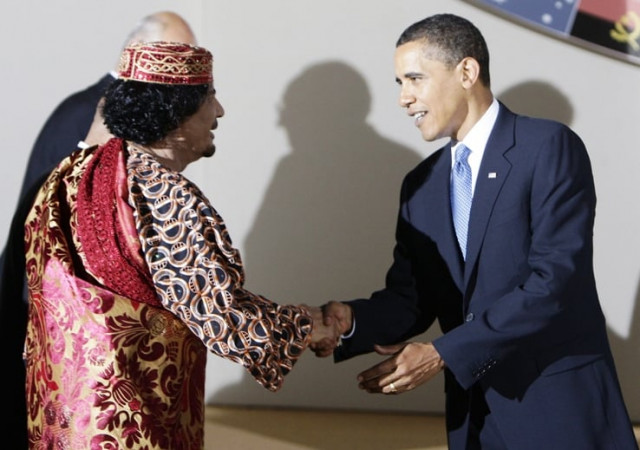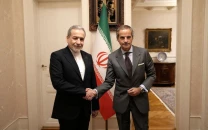UN Council hits Qaddafi with sanctions over crackdown
UN Security Council has imposed sanctions against Moamer Qaddafi in a new bid to halt the bloodshed in Libya.

A vote by the 15-nation body at a solemn Saturday night meeting called for a travel ban and assets freeze against Qaddafi and his family and associates and an arms embargo against Libya, where the UN says more than 1,000 people have been killed.
The council united to condemn what it called violence incited "from the highest level" of Libyan leaders.
The travel ban and assets freeze in Resolution 1970 target the 68-year-old Libyan leader, four of his sons and daughter Aisha, and top defense and intelligence officials accused of playing a role in the bloodshed.
The 16 names on the sanctions list were cut from 22 during negotiations. Diplomats said this was a move to encourage senior regime members to turn against Qaddafi.
The bloodshed was referred to the International Criminal Court because the council said "the widespread and systematic attacks currently taking place (in Libya) against the civilian population may amount to crimes against humanity."
Under the resolution all arms sales to Libya must stop immediately. The resolution also called on Libya to let in humanitarian supplies and to protect foreigners.
The measures were "a powerful signal of the determination of the international community to stand with the people of Libya and determine their own future," said Britain's UN ambassador Mark Lyall Grant who led the resolution campaign with France, Germany and the United States.
Reflecting the unanimous condemnation of Qaddafi, South Africa's envoy Baso Sangqu said the whole world had been shocked by "the untold atrocities".
US ambassador to the United Nations, Susan Rice, said the council "has come together to condemn the violence, pursue accountability, and adopt biting sanctions, targeting Libya’s unrepentant leadership."
The landmark vote saw the United States support referring a crisis case to the International Criminal Court for the first time.
The United States is not a member of the ICC and abstained when the Darfur conflict in Sudan was sent to the international court in 2005. China and Russia also backed the Libya resolution even though they also traditionally oppose sanctions action against individual countries.
Libya is the first of the Arab nations hit by political and social turmoil in recent weeks to be discussed at the Security Council.
Its deputy ambassador, Ibrahim Dabbashi, who has turned against the Qaddafi regime, said the resolution would give "moral support for the people who are resisting and being fired upon by the regime."
Pressure on the council to act had increased by a warning from UN Secretary General Ban Ki-moon on Friday that a delay in taking "concrete action" would cost lives.
Libya's UN ambassador, Abdurrahman Shalgam, the country's former foreign minister, also made an impassioned plea for the council to take action against the "atrocities" committed by his childhood friend Qaddafi.
In negotiations, several countries raised reservations about referring Libya to the International Criminal Court.
But Shalgham wrote a letter to the council on Saturday expressing strong backing for the resolution and involving the ICC.
"Faced with the atrocities we are seeing, impunity is no longer an option," French UN envoy Gerard Araud told the council.
Debate on the Libya crisis returns to the UN headquarters next Tuesday when the general assembly votes on a motion to suspend the nation from the UN Human Rights Council. The action requires a two thirds majority from the 191 member states and western nations are already lobbying for support.



















COMMENTS
Comments are moderated and generally will be posted if they are on-topic and not abusive.
For more information, please see our Comments FAQ